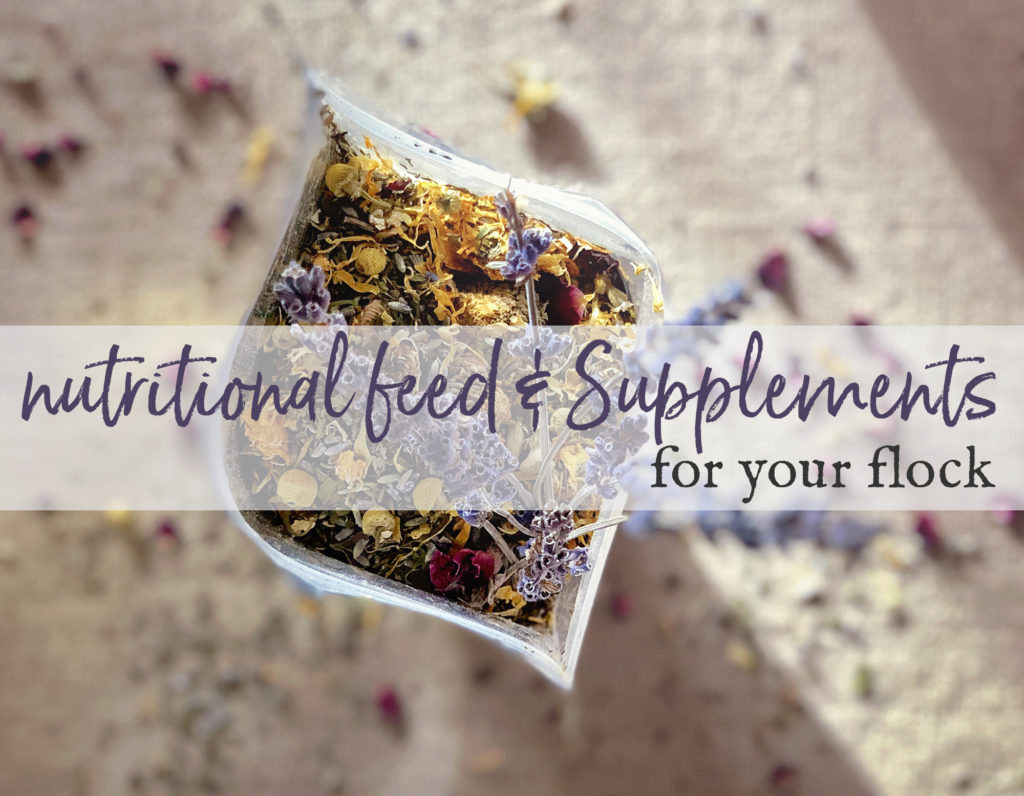
I get a lot of questions lately regarding what and how we feed our flocks, so I thought I would answer some of those questions here. I post lots of pictures and videos of my chickens eating some unusual things and I always get some funny responses from you guys. Yes, my chickens are savages and will eat just about anything I give them, but I have had my share of individual chickens and even entire flocks of very picky chickens that refused to go near some of my supplemental treats let alone eat them! I devised a couple of easy ways to encourage them to try and eventually love consuming new, healthy and beneficial additions to their usual eating and drinking routines.
Heres a couple of tips:
Adding a supplement, vitamin, medicine, garlic, ACV to their water and they won’t touch it?
- Remove their regular water source temporarily, and give them their supplemented water as their only drinking liquid.
- Give them this temporary water in a shallow open bucket or large bowl rather than a container watering system. A low bucket of fresh open water is hard for chickens to resist.
- Enhance the flavor of the water with fresh mint or basil leaves
- Toss some goodies in the water such as sliced cucumbers, watermelon chunks, fresh or frozen blueberries (during the hot months), or fresh or frozen corn. The goodies will slowly sink to the bottom, forcing the chickens to drink the water to get to the treats!
- Add some steeped and cooled herbal tea to the water. My hens love this.
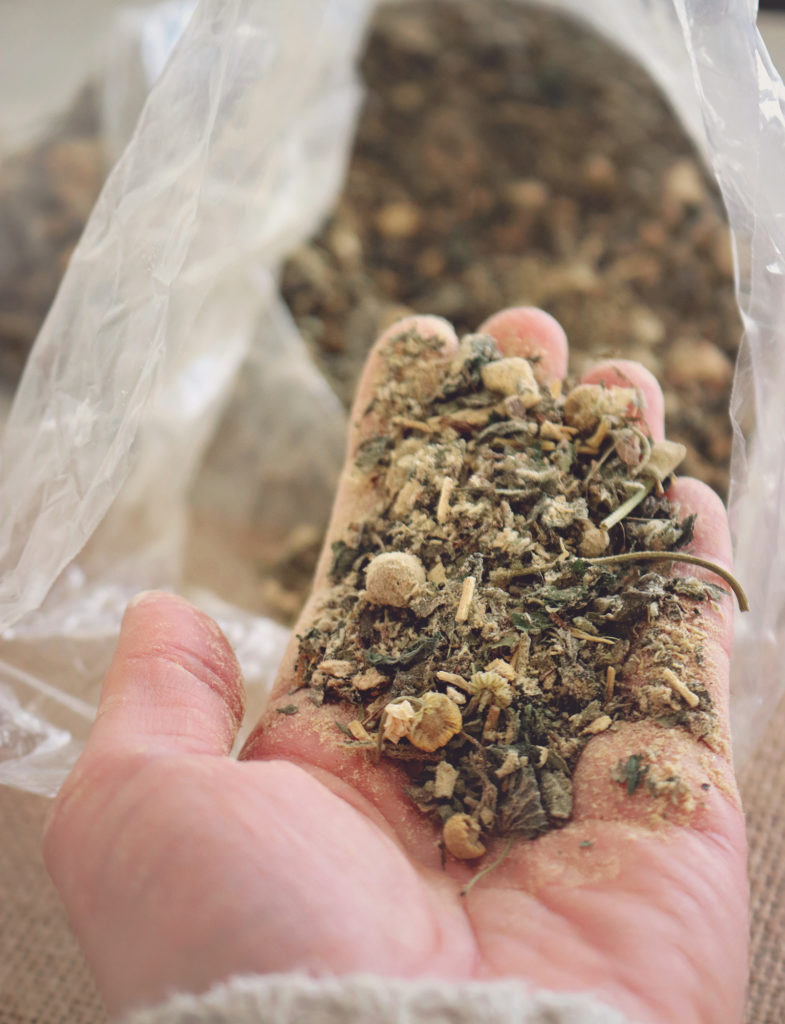
Are your chickens eating the grains, or large bits out of the feed and leaving lots of dust/fines behind to go to waste?
- Pour some sort of liquid over the fine dust and mix it into an oatmeal consistency and watch them eat it right up. You can use low sodium chicken broth or bone broth, diluted apple juice, cooled brewed herbal tea, or a wetter version of fermented feed works well too. In a pinch, just use water!
- Scoop up the dust or feed remains and add it to your fermented feed with extra water for feeding the following day
- Or use the remaining feed dust as a bottom barrier to your fermented feed (which can be a bit sticky and messy and leave a crust on feeding containers if there isn’t some dry feed down first
EVERYDAY FEED
Our chickens are provided with free choice feed all day long. I usually feed them in the morning and by sunset it’s almost all gone, which is the goal, as I don’t want to leave feed around overnight to encourage rodents or insects or potential predators. I also never feed them inside the coop, but rather always outside in their covered runs.
We feed exclusively Scratch and Peck Feeds, because it truly is the best feed on the market. Not only is it 100% organic and non-gmo certified, but it’s whole raw grains, NOT a pellet and NOT a crumble. Both pellets and crumbles are heat processed, which can destroy heat sensitive ingredients such as enzymes, vitamins, amino acids and probiotics and require further processing post pelleting in order to add some of these nutrients back in – at lower quality than the original. In order to make the product cheaper overall, lots of fillers and additives void of real nutrition are added and then bulked up with genetically modified corn and soy. Despite all of that, the proof is in the pudding. My chickens hate that type of feed and refuse to eat it, and it’s not because they are picky or spoiled – okay they are a little spoiled, but picky they definitely are not. Chickens have a way of sensing what to eat and what not to eat based on what is good for them. Ever had a toxic or poisonous plant that the chickens just don’t mess with, yet your precious basil plant is eaten down to the roots? Yep, they know.
Okay, maybe that’s not the best example…I mean traditional pelleted chicken feed isn’t toxic, but it’s certainly not as nutritious and healthy as it could be. I suppose it’s more akin to mass produced wonder bread vs an organic whole grain loaf from a high-end bakery. The wonder bread is going to feed you, but you may not feel very good after eating it. And my chickens have eaten raw whole grains since the day they were hatched here on the farm. We start them at day 1 eating this way, it’s just chopped up finer for tiny beaks and crops!
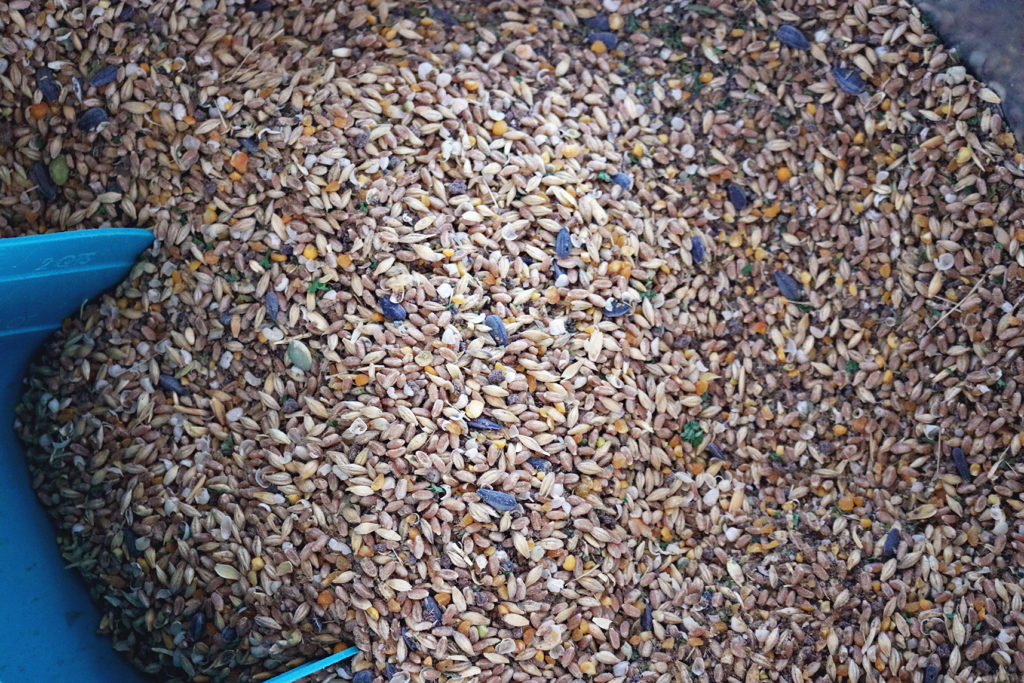
Scratch and Peck’s motto is, “you are what your animals eat” and I love that because in the case of our precious hens, what we feed them literally becomes our breakfast. Chickens just prefer to eat the way grandma used to feed them…with raw grains! Try a small bag of it and you’ll see the difference, I promise you.
*** NOTE: If Scratch and Peck is not available in stores in your area (it’s not sold anywhere in the state of Texas), there is an amazing company called Azure Standard. You can sign up for Azure’s delivery service at a drop site near you. They deliver once a month and you just meet at the drop site on your delivery day at the delivery time and pick up your order. They have tons of other amazing organic products as well, not just feed. I blanched, sliced and froze 40 lbs of the most delicious fresh peaches last summer that I bought from them! If you want to check it out and see if there is a drop near you, click here to get started with Azure.***
FERMENTED FEED
You’ve heard the news, fermented foods are good for us! But they are also good for our animals, especially chickens!
The process of lacto-fermentation greatly enhances the nutritional content of the feed. It produces a healthy dose of B vitamins, vitamin K, and enzymes. But, probably the largest benefit of fermentation is the introduction of probiotics. Boosting the amount of good bacteria in our animal’s guts is ALWAYS a good thing, as that also means we are boosting their immune system along with increasing the nutrition and digestibility of the feed.
The great news is that any feed can be fermented. It does not need to be whole or raw. Pellets, crumbles, mash, layer feed, grower feed and even chick starter feed can be fermented. You can ferment scratch grains, whole oats, barley, wheat berries, legumes, etc. You can ferment all of your chickens daily feed or just ferment a small amount and pour it over their daily feed, which is a great way to add some extra nutrition to a lower quality feed like pellets or crumbles.
And it couldn’t be easier to do.
You need just three things:
- The feed or grains you want to ferment
- Fresh water
- A bucket
Start with a relatively small amount of grains or feed until you get acquainted with the process.
- Add your dry feed, grains, seeds, legumes, etc. to the bottom of a clean bucket
- Cover with fresh water and stir until completely moistened. You will need to continue adding water until all of the feed is wet. Make sure there are no dry pockets by stiring well. Let this wet mixture sit for a few hours, covered but with access to air (a tea towel works well)
- Add enough water to cover the wet feed by about 2 inches. The feed will quickly absorb a lot of water but its imperative that it all stay submerged under the water to avoid growing mold or bad bacteria. Keep the bucket covered the entire time with a tea towel or lid with small air holes.
- Leave the feed to ferment for 3 days, stiring at least once per day and adding water as needed to keep the feed submerged
- Feed the fermented grains to your flock on day 3, leaving a small amount left over in the bucket to start your next batch. Add more fresh food and water to the remaining fermented feed and start again. Soon, the feed will ferment and be bubbly and pleasantly sour in 1-2 days instead of 3.
*You can make the fermenting process happen sooner, if you add a bit of water keifer or ripe sourdough starter to the fresh water on day 1. And speaking of sourdough starter…
SOURDOUGH STARTER
If you have a wild yeast starter that you’re feeding, save the discard! Mix it with a little bit of fresh water and pour it right over your chicken’s feed or mix it in. Starter is just a mild, sour slurry of whole grain flours such as wheat and rye, fresh water and lots of good yeast. It’s already partially digested so its very easy on a chicken’s digestive system.
Here’s a fun fact: Sourdough is loaded with bugs, GOOD bugs—some 50 million yeasts and 5 billion lactobacilli bacteria in every teaspoon of starter.
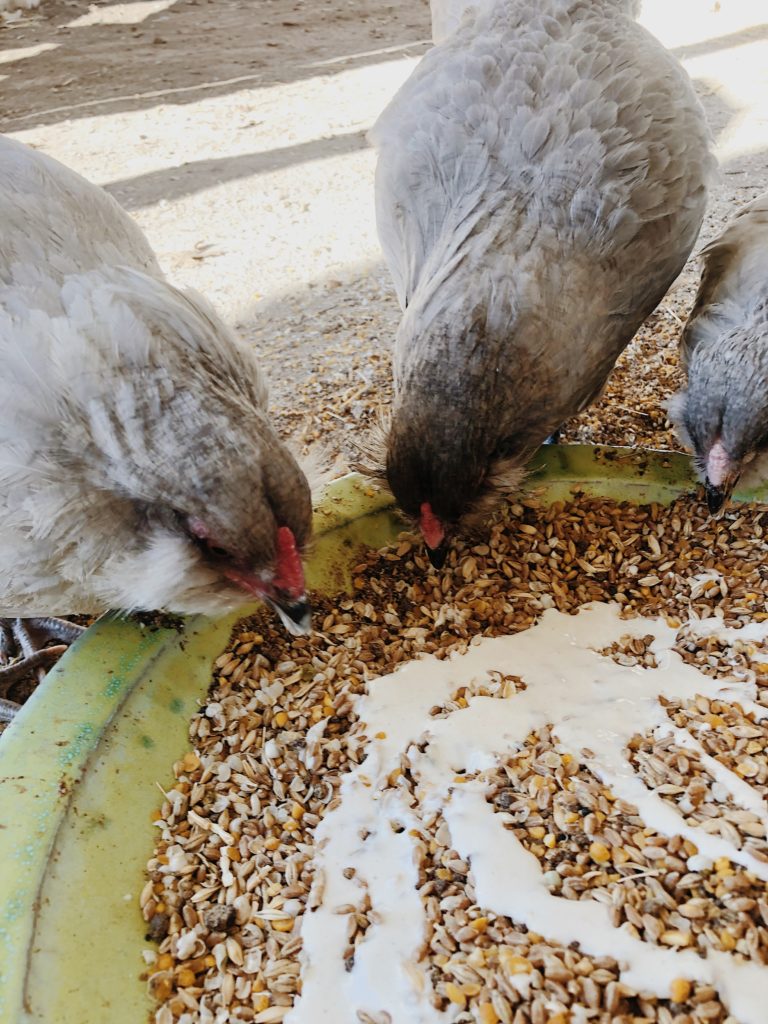
JUST SAY NO TO YOGURT
I know this is an unpopular opinion among most chicken folks as you guys loooove to feed your chickens yogurt. But here’s the facts…chickens lack the necessary enzymes to properly digest dairy. I know, I know…you’ve heard it’s SO good for them and SO healthy and full of probiotics…
It’s not a lactose intolerance like some humans have, where the issue is with the milk sugars. The problem is that they can’t properly digest the milk proteins. When dairy products are pasteurized, it destroys many of the enzymes needed to digest the proteins found in milk, and even if the yogurt does have some probiotics in it – mainly acidophilus, and in no where near the amounts people THINK are in there, the benefits of that small amount of good bacteria they will consume don’t outweigh the potential digestive distress the dairy itself will cause. The main side effect of this lack of digestibility is chronic diarrhea, which is ironic because most people feed yogurt to chickens who are sick or weak or exhibiting signs of illness such as lethargy or…you guessed it – diarrhea. So you’re actually making the initial illness or problem worse by feeding them yogurt.
Now this of course doesn’t apply to raw dairy products, as the enzymes nature put in the milk are still very much intact, which is why many humans can digest raw dairy and not pasteurized dairy. I’ve heard of raw dairy farmers feeding raw milk to their chickens by the bucket full, and those chickens are actually very healthy.
Instead of yogurt, use powdered probiotics such as ProBios or start some sourdough starter and feed them that instead!
ADD HERBS TO FEED
Another way to increase the nutritional value of your chicken feed, is to add dried herbs. Various herbal blends are a wonderful way to supplement with additional protein, add omega-3 fatty acids, and increase immune boosting capabilities as well as egg production.
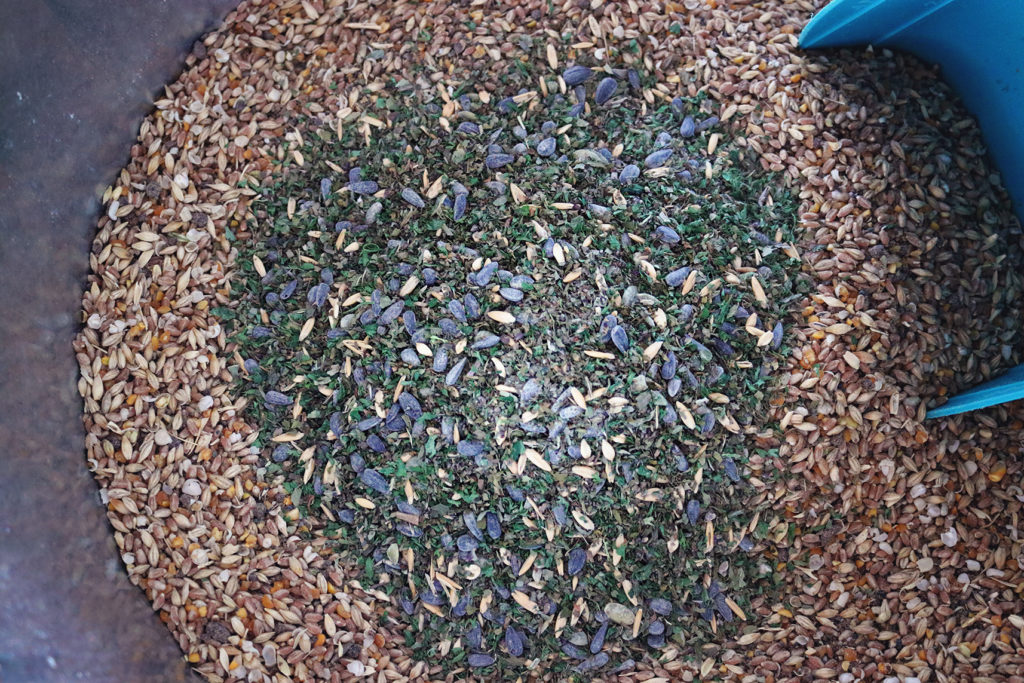
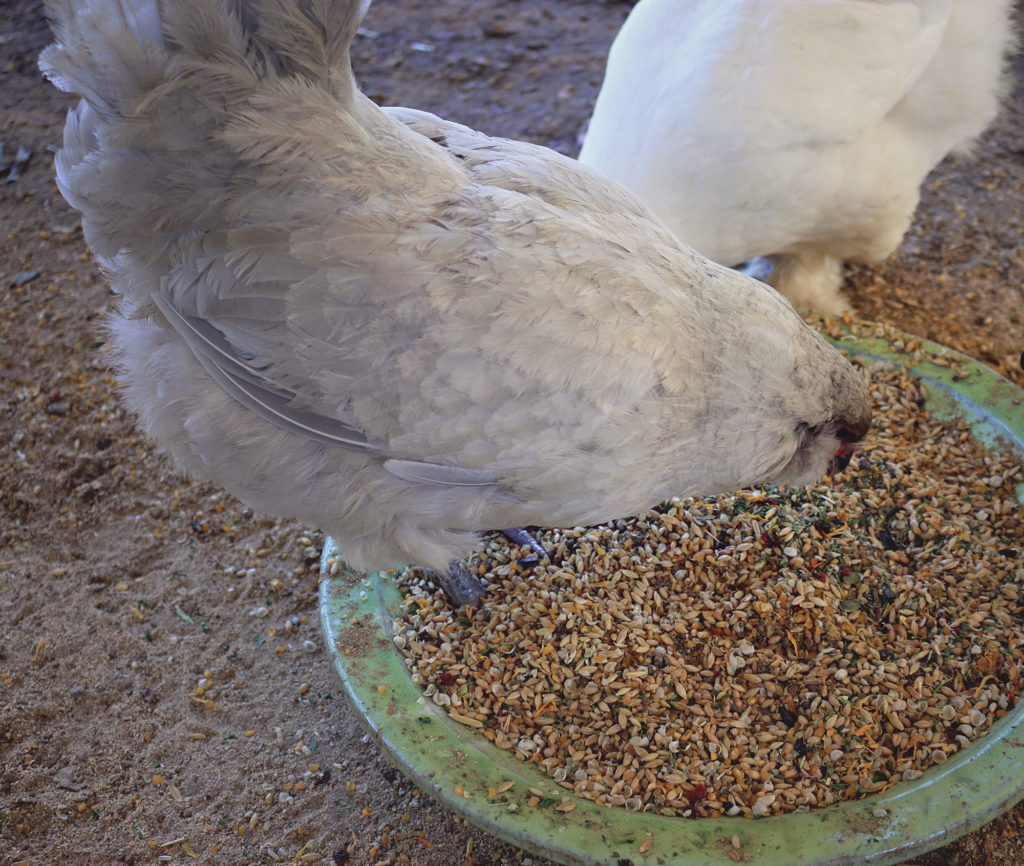
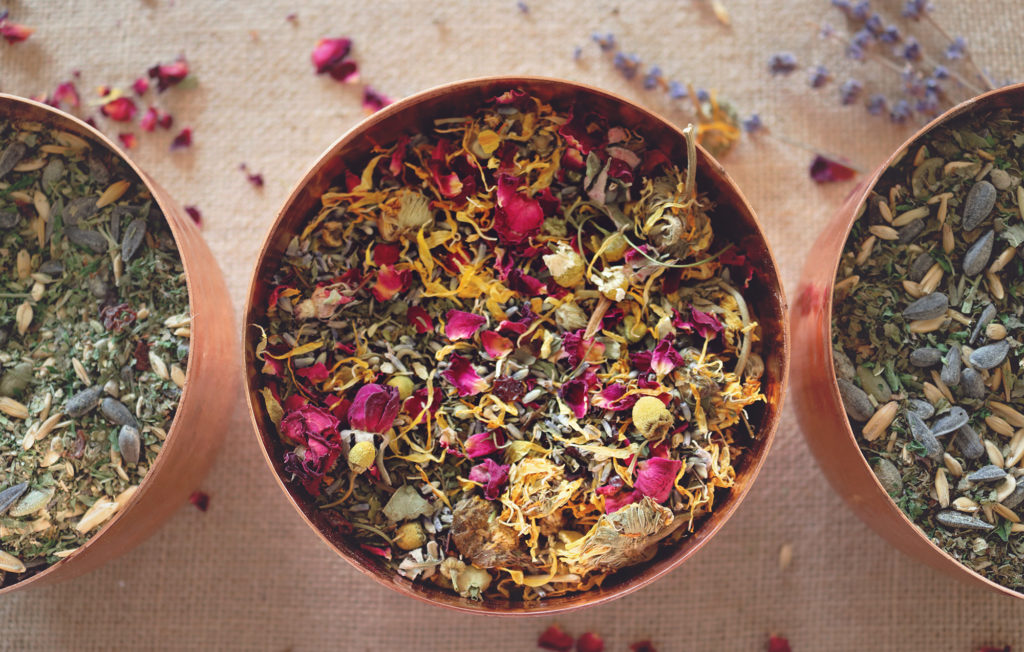
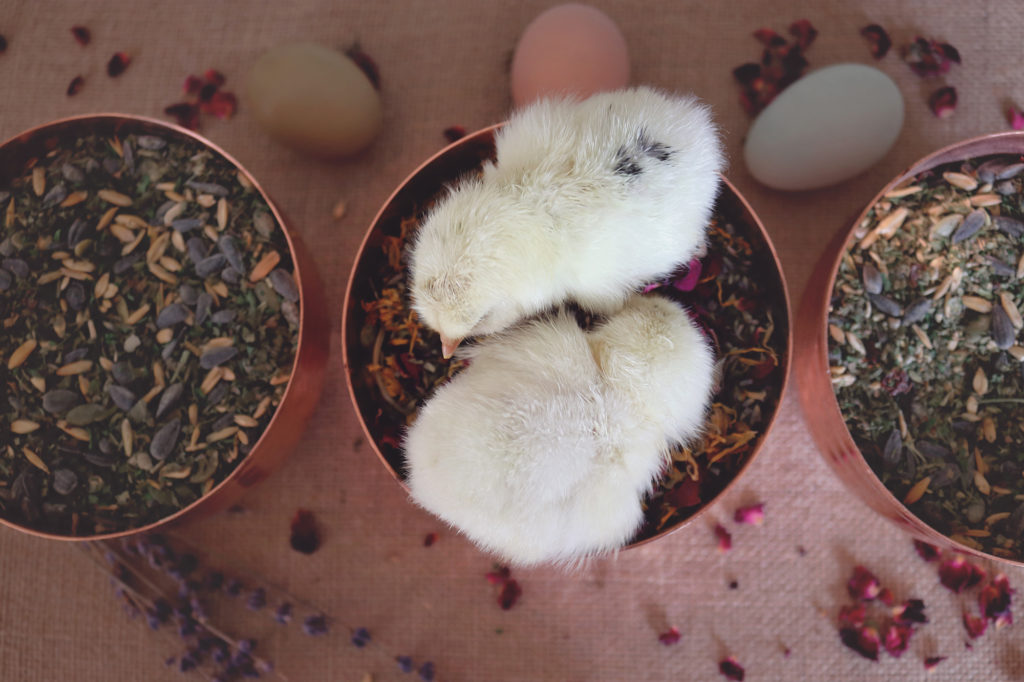
And while you’re at it, freshen up those nesting boxes with some beautiful and aromatic nesting box herbs. The hens will eat some of it as they are scratching around making their cozy nests, and the rest will provide aromatherapy to calm laying hens and encourage laying.
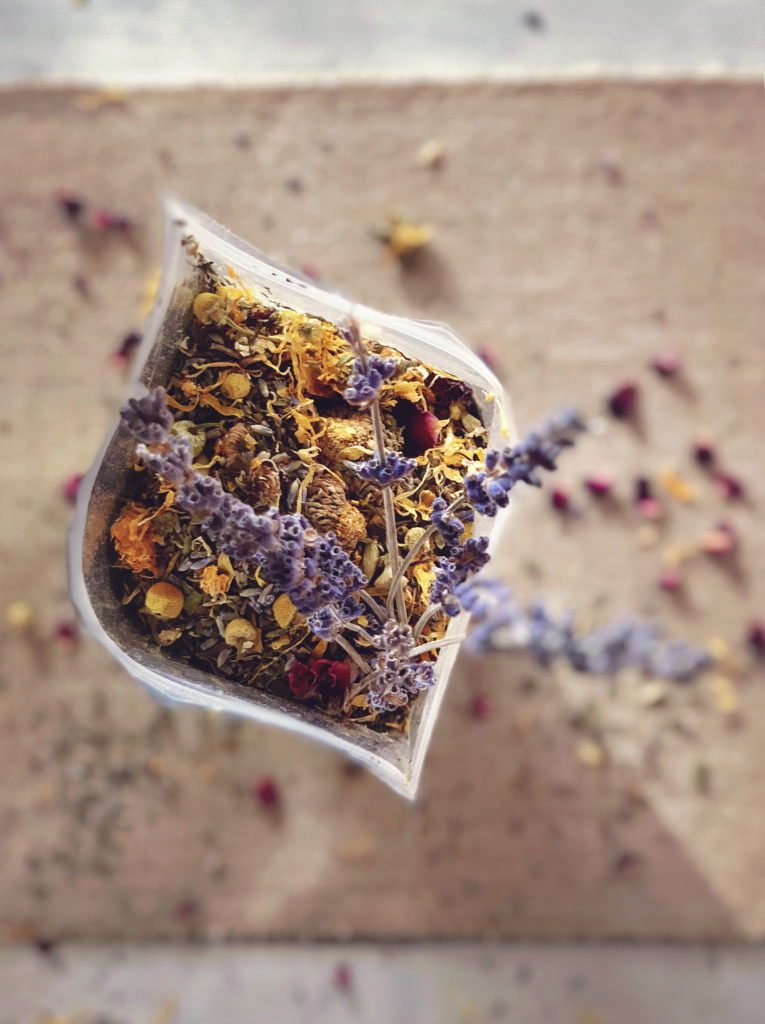
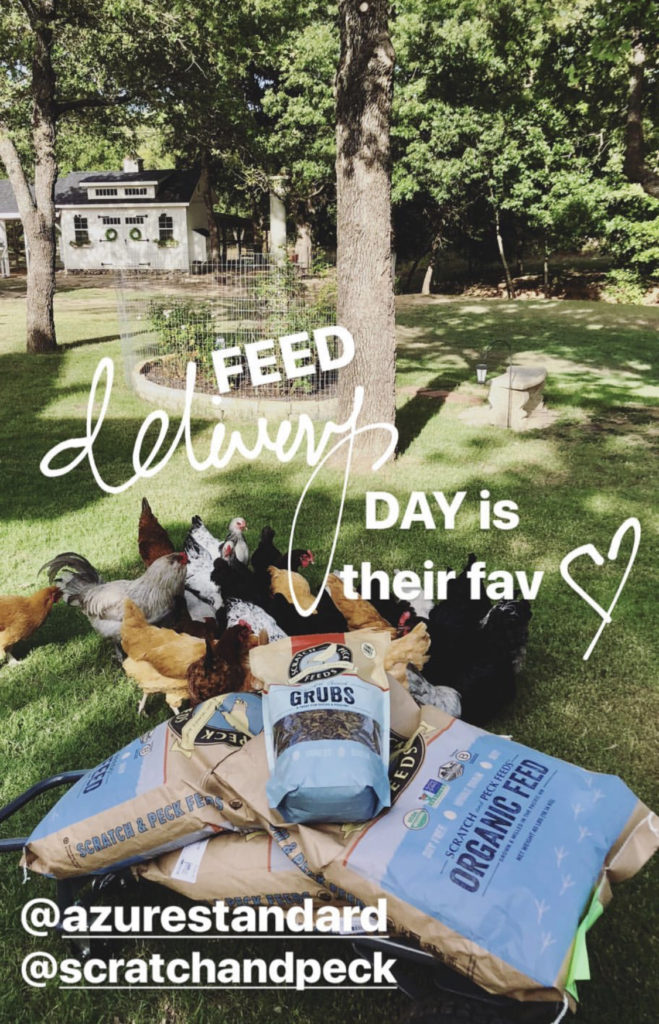

This is such a great article!!! I came looking for info about feeding sourdough starter to chickens, and I’ve learned so much more now too (hello, fermenting feed!) – we will now try and source grain feed instead of pellets, and the dried herbs is genius!
Thanks!